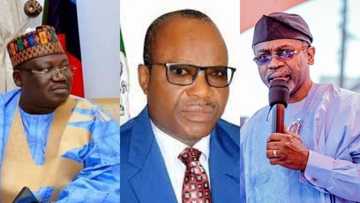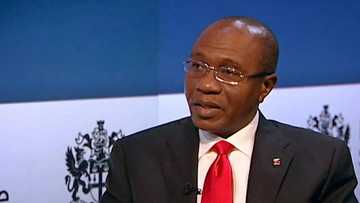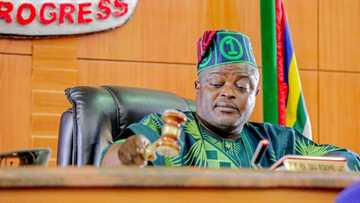President Buhari Lists 9 ‘Worrisome Changes’ Lawmakers Made to 2022 Budget, Reveals What He Will Do
On Friday, December 31, President Muhammadu Buhari signed into law the 2022 Appropriation Bill in the Presidential Villa.
PAY ATTENTION: Click “See First” under the “Following” tab to see Legit.ng News on your Facebook News Feed!
The president, however, expressed strong reservations on the ‘‘worrisome changes’’ made by the National Assembly to the 2022 Executive Budget proposal, a statement his spokesman, Garba Shehu, indicates.
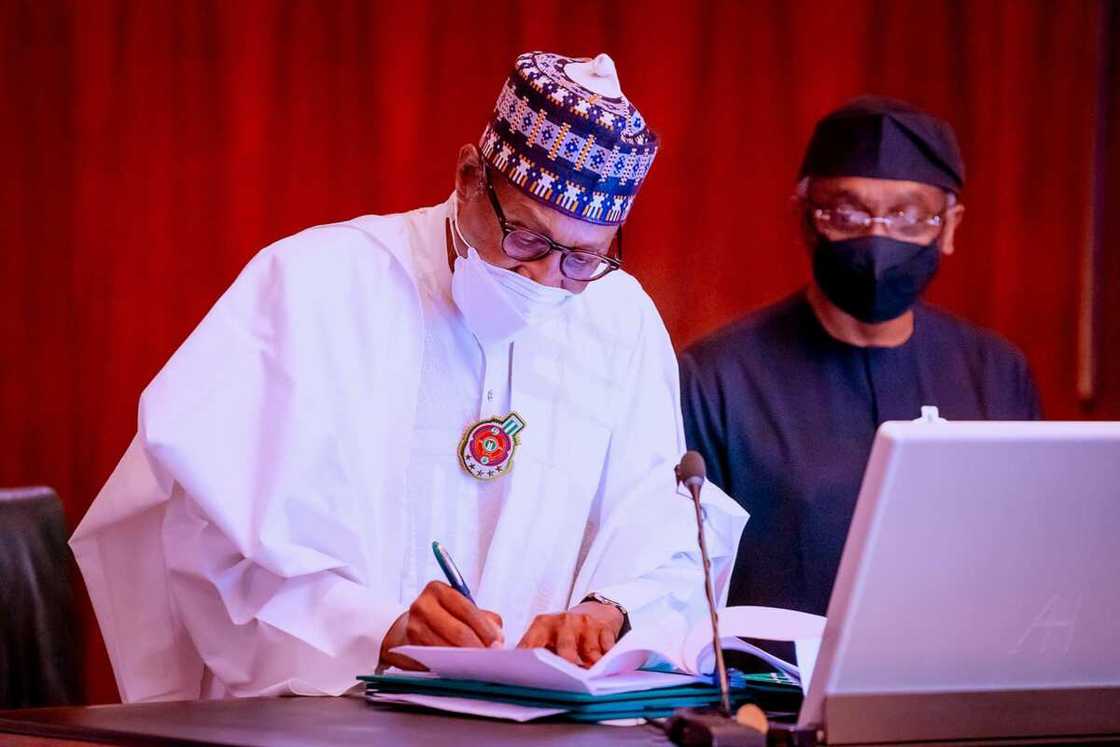
Source: Facebook
He went ahead to list the "worrisome changes". They are as follows:
1. Increase in projected FGN Independent Revenue by N400bn
President Buhari noted that though the legislators reduced Independent Revenue by N400 billion, they did not provide him with justification for doing so.
PAY ATTENTION: Install our latest app for Android, read best news on Nigeria’s #1 news app
2. Reduction in the in the provision for Sinking Fund to Retire Maturing Bonds by N22bn
The president is also not happy the National Assembly's reduction in the provision for Sinking Fund to Retire Maturing Bonds by N22 billion.
He noted that the lawmakers also did not offer any explanation for the reduction.
3. Reductions in the allowances budgeted for police and navy
President Buhari stated that there was also reduction of the provisions for the Non-Regular Allowances of the Nigerian Police Force and the Nigerian Navy by N15 billion and N5 billion respectively.
He noted that reduction is "particularly worrisome because personnel cost provisions are based on agencies’ nominal roll and approved salaries/allowances".
4. Increase of N21.72bn in the Overhead budgets of some MDAs
According to President Buhari, the National Assembly effected an increase of N21.72 billion in the Overhead budgets of some MDAs while the sum of N1.96 billion was cut from the provision for some MDAs.
He noted that the lawmakers also failed to provide apparent justification for their action.
5. Increase in the provision for Capital spending by N575.63bn
Another change that is of concern to the president is the increase in the provision for Capital spending (excluding Capital share in Statutory Transfer) by a net amount of N575.63 billion, from N4.89 trillion to N5.47 trillion.
6. Reductions in provisions for some critical projects
President Buhari also expressed concern in the reductions in provisions for some critical projects.
These include:
- N12.6 billion in the Ministry of Transport’s budget for the ongoing Rail Modernisation projects
- N25.8 billion from Power Sector Reform Programme under the Ministry of Finance, Budget and National Planning
- N14.5 billion from several projects of the Ministry of Agriculture, and introducing over 1,500 new projects into the budgets of this Ministry and its agencies.
7. Inclusion of new provisions totaling N36.59bn for National Assembly’s projects
President Buhari is also worried over the lawmakers' inclusion of new provisions totaling N36.59 billion for National Assembly’s projects in the Service Wide Vote.
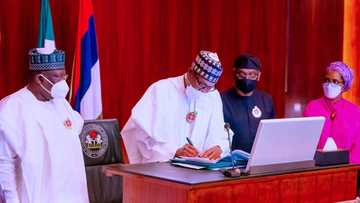
Read also
Breaking: Buhari signs 2022 budget, plans to spend all oil revenue on debt servicing and still wont be enough
According to the president, this negates the principles of separation of Powers and financial autonomy of the Legislative arm of government.
8. Reduction of the provisions made for over 10,000 projects
The president lamented that provisions made for as many as 10,733 projects were reduced while 6,576 new projects were introduced into the budget by the National Assembly.
According to him, the changes made by the lawmakers are in the form of new insertions, outright removals, reductions and/or increases in the amounts allocated to projects.
9. Introduction of empowerment projects and reduction of provisions for strategic capital projects
President Buhari said he is also worried that the lawmakers reduced the provisions for many strategic capital projects to introduce ‘Empowerment’ projects.
He said:
‘‘The cuts in the provisions for several of these projects by the National Assembly may render the projects unimplementable or set back their completion, especially some of this Administration’s strategic capital projects."
The president noted that most of the projects inserted by the lawmakers relate to matters that are basically the responsibilities of state and local governments.
He added the inserted projects also do not appear to have been properly conceptualised, designed and costed.
The president further stated:
‘‘Many more projects have been added to the budgets of some MDAs with no consideration for the institutional capacity to execute the additional projects and/or for the incremental recurrent expenditure that may be required.’’
Why sign the appropriation bill despite the worrisome changes?
President Buhari explained that he signed the 2022 Appropriation Bill into law, despite the worrisome changes, to enable its implementation to commence on 1st January 2022.
He announced that he would revert to the National Assembly with a request for amendment as soon as the lawmakers resume.
The president explained that the move is important to ensure that critical ongoing projects cardinal to his administration do not suffer a setback due to reduced funding.
He recalled that he had stated that the fiscal year 2022 would be very crucial in his administration’s efforts to complete and put to use critical agenda projects, as well as improve the general living conditions of our people.
The president also commended the understanding and speedy action of the National Assembly on the budget.
Electoral amendment bill: Why senators dropped plot to override Buhari's veto
In another report, the Senate has reportedly dropped the plan to override President Buhari following his decision not to sign the Electoral Amendment Bill 2021.
The senators abandoned the plan following overnight lobbying by six governors. It was gathered that the six governors, led by the Chairman of the Caretaker Committee of the ruling All Progressives Congress (APC), Mallam Mai Mala Buni, lobbied senators overnight to stay action on their plan.
Legit.ng gathered that the lobbying which started at about 9pm on Tuesday, December 22, ended at 5am on Wednesday, December 23.
Source: Legit.ng



